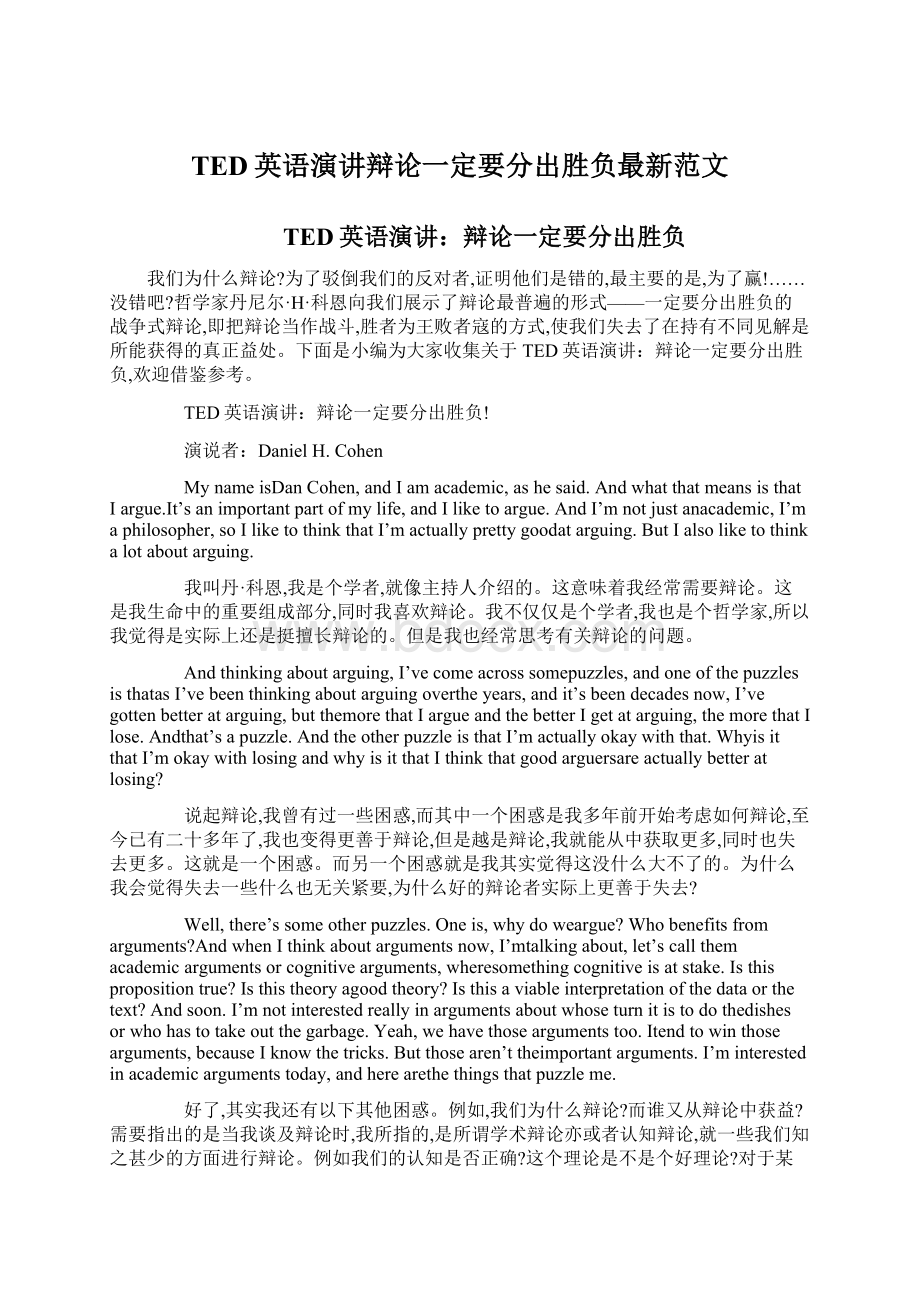TED英语演讲辩论一定要分出胜负最新范文.docx
《TED英语演讲辩论一定要分出胜负最新范文.docx》由会员分享,可在线阅读,更多相关《TED英语演讲辩论一定要分出胜负最新范文.docx(5页珍藏版)》请在冰豆网上搜索。

TED英语演讲辩论一定要分出胜负最新范文
TED英语演讲:
辩论一定要分出胜负
我们为什么辩论?
为了驳倒我们的反对者,证明他们是错的,最主要的是,为了赢!
……没错吧?
哲学家丹尼尔·H·科恩向我们展示了辩论最普遍的形式——一定要分出胜负的战争式辩论,即把辩论当作战斗,胜者为王败者寇的方式,使我们失去了在持有不同见解是所能获得的真正益处。
下面是小编为大家收集关于TED英语演讲:
辩论一定要分出胜负,欢迎借鉴参考。
TED英语演讲:
辩论一定要分出胜负!
演说者:
DanielH.Cohen
MynameisDanCohen,andIamacademic,ashesaid.AndwhatthatmeansisthatIargue.It’sanimportantpartofmylife,andIliketoargue.AndI’mnotjustanacademic,I’maphilosopher,soIliketothinkthatI’mactuallyprettygoodatarguing.ButIalsoliketothinkalotaboutarguing.
我叫丹·科恩,我是个学者,就像主持人介绍的。
这意味着我经常需要辩论。
这是我生命中的重要组成部分,同时我喜欢辩论。
我不仅仅是个学者,我也是个哲学家,所以我觉得是实际上还是挺擅长辩论的。
但是我也经常思考有关辩论的问题。
Andthinkingaboutarguing,I’vecomeacrosssomepuzzles,andoneofthepuzzlesisthatasI’vebeenthinkingaboutarguingovertheyears,andit’sbeendecadesnow,I’vegottenbetteratarguing,butthemorethatIargueandthebetterIgetatarguing,themorethatIlose.Andthat’sapuzzle.AndtheotherpuzzleisthatI’mactuallyokaywiththat.WhyisitthatI’mokaywithlosingandwhyisitthatIthinkthatgoodarguersareactuallybetteratlosing?
说起辩论,我曾有过一些困惑,而其中一个困惑是我多年前开始考虑如何辩论,至今已有二十多年了,我也变得更善于辩论,但是越是辩论,我就能从中获取更多,同时也失去更多。
这就是一个困惑。
而另一个困惑就是我其实觉得这没什么大不了的。
为什么我会觉得失去一些什么也无关紧要,为什么好的辩论者实际上更善于失去?
Well,there’ssomeotherpuzzles.Oneis,whydoweargue?
Whobenefitsfromarguments?
AndwhenIthinkaboutargumentsnow,I’mtalkingabout,let’scallthemacademicargumentsorcognitivearguments,wheresomethingcognitiveisatstake.Isthispropositiontrue?
Isthistheoryagoodtheory?
Isthisaviableinterpretationofthedataorthetext?
Andsoon.I’mnotinterestedreallyinargumentsaboutwhoseturnitistodothedishesorwhohastotakeoutthegarbage.Yeah,wehavethoseargumentstoo.Itendtowinthosearguments,becauseIknowthetricks.Butthosearen’ttheimportantarguments.I’minterestedinacademicargumentstoday,andherearethethingsthatpuzzleme.
好了,其实我还有以下其他困惑。
例如,我们为什么辩论?
而谁又从辩论中获益?
需要指出的是当我谈及辩论时,我所指的,是所谓学术辩论亦或者认知辩论,就一些我们知之甚少的方面进行辩论。
例如我们的认知是否正确?
这个理论是不是个好理论?
对于某些数据或者文字这是不是一个很好的解释?
以及很多其他的问题。
我无心去争论今天该谁洗碗或者谁应该倒垃圾。
当然,我们也会为那些问题争论。
我经常在那类争论争论中胜出,因为我知道一些技巧。
当时那些辩论没有那么重要。
我感兴趣的是那些学术性辩论,而接下来这是我感到困惑的事情。
First,whatdogoodarguerswinwhentheywinanargument?
WhatdoIwinifIconvinceyouthatutilitarianismisn’treallytherightframeworkforthinkingaboutethicaltheories?
Sowhatdowewinwhenwewinanargument?
Evenbeforethat,whatdoesitmattertomewhetheryouhavethisideathatKant’stheoryworksorMill’stherightethicisttofollow?
It’snoskinoffmybackwhetheryouthinkfunctionalismisaviabletheoryofmind.Sowhydoweeventrytoargue?
Whydowetrytoconvinceotherpeopletobelievethingsthattheydon’twanttobelieve?
Andisthatevenanicethingtodo?
Isthatanicewaytotreatanotherhumanbeing,tryandmakethemthinksomethingtheydon’twanttothink?
首先,当人们赢得一场辩论的时候,作为一个优秀的辩论者,他从中学到了什么?
如果我能说服你实用主义不能用来解释道德理论的话,我能从中获得什么呢?
所以我们到底可以从一场辩论中学到什么?
而且在此之前,你是追随康德还是密尔又有跟我什么关系呢?
无论你是否认为,功能主义是否是一个可取的思维方式都对我没有什么影响。
所以我们为什么会想去辩论?
为什么我们要去说服别人相信那些他们不愿相信的事情?
我们到底应不应该这么做?
用这种方式去对待他人,迫使他们去思考一些他们不想去思考的东西?
Well,myanswerisgoingtomakereferencetothreemodelsforarguments.Thefirstmodel,let’scallthisthedialecticalmodel,isthatwethinkofargumentsaswar,andyouknowwhatthat’slike.There’salotofscreamingandshoutingandwinningandlosing,andthat’snotreallyaveryhelpfulmodelforarguingbutit’saprettycommonandentrenchedmodelforarguing.
好了,为了回答这个问题,让我们来参照三种不同的辩论方式.第一种模式,让我们称之为辩证模式,这种模式的辩论更想是打仗,相信你们都经历过。
经常充满了尖叫和大喊而且伴有胜负,这对于辩论来说不是一个很有帮助的方式却也是相当常见且”侵略性“的方式。
Butthere’sasecondmodelforarguing:
argumentsasproofs.Thinkofamathematician’sargument.Here’smyargument.Doesitwork?
Isitanygood?
Arethepremiseswarranted?
Aretheinferencesvalid?
Doestheconclusionfollowfromthepremises?
Noopposition,noadversariality,notnecessarilyanyarguingintheadversarialsense.
这里还有第二种辩论的模式:
论证式想想数学家的辩论。
这是我的辩论方式.它有用吗?
有什么优点吗?
我们论证时的前提是正确的吗?
我们的推论有效吗?
我们的结论是否由前提推导出来?
没有对立,没有敌意,辩论并非必须在一个敌对意识下进行。
Butthere’sathirdmodeltokeepinmindthatIthinkisgoingtobeveryhelpful,andthatisargumentsasperformances,argumentsasbeinginfrontofanaudience.Wecanthinkofapoliticiantryingtopresentaposition,tryingtoconvincetheaudienceofsomething.Butthere’sanothertwistonthismodelthatIreallythinkisimportant,namelythatwhenwearguebeforeanaudience,sometimestheaudiencehasamoreparticipatoryroleintheargument,thatis,argumentsarealsoaudiencesinfrontofjurieswhomakeajudgmentanddecidethecase.Let’scallthistherhetoricalmodel,whereyouhavetotailoryourargumenttotheaudienceathand.Youknow,presentingasound,well-argued,tightargumentinEnglishbeforeafrancophoneaudiencejustisn’tgoingtowork.Sowehavethesemodels--argumentaswar,argumentasproof,andargumentasperformance.
但是我们还应该注意到其实还有第三种方式,我认为它非常有效,它就是表演式辩论,如同在观众面前辩论。
我们可以想想一个政客想要竞选一个职位,或尝试去让他的观众接受他的政见。
但是我认为对这个模式的一个曲解有必要指出,亦即当我们在观众面前辩论时,有些时候观众在辩论中起了更重要的参与作用,我们的如同面对了一群陪审团,他们判断是非,裁定诉案。
让我们称之为修辞模式,这种模式下你就要像裁缝一样为观众量身定制一场辩论。
你要一场听上去激烈讨论,严谨论证的英语辩论,而听众是一群法国人,那就是白费力气。
你看我们有这么多辩论模式--战争式辩论,论证式辩论,表演式辩论。
Ofthosethree,theargumentaswaristhedominantone.Itdominateshowwetalkaboutarguments,itdominateshowwethinkaboutarguments,andbecauseofthat,itshapeshowweargue,ouractualconductinarguments.
在这三种模式中,战争式辩论占了主导。
它使每当我们提起辩论,就是这种模式。
这种模式基本代表了我们对辩论的理解,也因此,它影响了我们辩论的方式,我们在辩论时的表现。
Now,whenwetalkaboutarguments,yeah,wetalkinaverymilitaristiclanguage.Wewantstrongarguments,argumentsthathavealotofpunch,argumentsthatarerightontarget.Wewanttohaveourdefensesupandourstrategiesallinorder.Wewantkillerarguments.That’sthekindofargumentwewant.Itisthedominantwayofthinkingaboutarguments.WhenI’mtalkingaboutarguments,that’sprobablywhatyouthoughtof,theadversarialmodel.Butthewarmetaphor,thewarparadigmormodelforthinkingaboutarguments,has,Ithink,deformingeffectsonhowweargue.
如今当我们谈起辩论,我们就会进入一种军国主义的论调。
我们需要具有攻击性的辩论,辩论时就如同给对手的脸上来上几拳,最好每个论点都直击要害。
我们想把自己武装起来,组织好策略去应对。
我们想要击败对手。
那就是我们想要的辩论。
这就是一种主流的辩论观。
当我说到辩论的时候,很可能你马上想到的就是敌对模式。
战争模式这个比方,或者说是对辩论模式的认知,在我看来正在削弱我们的辩论。
Firstitelevatestacticsoversubstance.Youcantakeaclassinlogic,argumentation.Youlearnallaboutthesubterfugesthatpeopleusetotryandwinarguments,thefalsesteps.Itmagnifiestheus-versus-themaspectofit.Itmakesitadversarial.It’spolarizing.Andtheonlyforeseeableoutcomesaretriumph,glorioustriumph,orabject,ignominiousdefeat.Ithinkthosearedeformingeffects,andworstofall,itseemstopreventthingslikenegotiationordeliberationorcompromiseorcollaboration.Thinkaboutthatone.Haveyoueverenteredanargumentthinking,“Let’sseeifwecanhashsomethingoutratherthanfightitout.Whatcanweworkouttogether?
”AndIthinktheargument-as-warmetaphorinhibitsthoseotherkindsofresolutionstoargumentation.Andfinally,thisisreallytheworstthing,argumentsdon’tseemtogetusanywhere.They’redeadends.Theyareroundaboutsortrafficjamsorgridlockinconversation.Wedon’tgetanywhere.
首先它使辩论的技巧凌驾与观点本身。
你可以去上关于逻辑与辩论的课程。
你可以学到所有人们在辩论中可以使用的诡计以力求去赢得一场辩论,多么愚蠢的方式啊。
这放大了辩论中我们与他们的对立关系。
这使辩论变得敌对。
如同以偏振镜来看问题。
而唯一可预见的结果就是胜利,一场欢欣鼓舞的胜利,抑或是卑怯,可耻的失败。
我认为那是一种变形效果,最遭的是,这种变形使这种辩论本身看上去不是那么像谈判,审议或妥协抑或者是一种协作。
在参加辩论的时候,你有没有想过让我们看看能不能共同敲定一些事情,而非由一方说服另一方有什么是我们可以共同协作的?
我觉得辩论如战争的这个比喻已经盖过了其他的辩论形式。
最终,最糟糕的是,通过争论我们不会学到什么东西。
这样的辩论就如同一个死胡同。
交流中的环状公路交通阻塞或者一个僵局。
我们停在原地,到不了任何其他地方。
Oh,andonemorething,andasaneducator,thisistheonethatreallybothersme:
Ifargumentiswar,thenthere’sanimplicitequationoflearningwithlosing.AndletmeexplainwhatImean.SupposeyouandIhaveanargument.Youbelieveaproposition,P,andIdon’t.AndIsay,”WellwhydoyoubelieveP?
”Andyougivemeyourreasons.AndIobjectandsay,“Well,whatabout...?
”Andyouanswermyobjection.AndIhaveaquestion:
“Well,whatdoyoumean?
Howdoesitapplyoverhere?
”Andyouanswermyquestion.Now,supposeattheendoftheday,I’veobjected,I’vequestioned,I’veraisedallsortsofcounter-considerations,andineverycaseyou’verespondedtomysatisfaction.Andsoattheendoftheday,Isay,“Youknowwhat?
Iguessyou’reright.P.”SoIhaveanewbelief.Andit’snotjustanybelief,butit’sawell-articulated,examined,it’sabattle-testedbelief.
噢,其实还有一件事情,作为一个教育工作者,这里还有一个问题困扰了我很久:
如果辩论是场战争,那么这也隐含着学习等于失去的意思。
让我解释一下我的观点。
比如说,你和我进行了一场辩论。
你主张观点,P,但是我不同意。
然后我说“好了,为什么你相信P”然后你给出了你的理由。
然后我反对并说,“好,那关于...?
”然后你回答我的反对。
然后我提问:
“额,你的意思是?
那么在这个地方他如何解释?
”然后你又回答了我的问题。
现在,假设一天快结束了,我反对,我提问,我给出了所有反对问题,然后在所有的问题上你都让我满意了。
然后在一天快要结束的时候,我说,”你知道吗?
我觉得在P这个观点上你没准是对的.“所以我有了新的见解.但是这不仅仅是一个见解,而是一个阐述清楚的,经过验证的,同时也是经得起挑战的见解。
Greatcognitivegain.Okay.Whowonthatargument?
Well,thewarmetaphorseemstoforceusintosayingyouwon,eventhoughI’mtheonlyonewhomadeanycognitivegain.Whatdidyougaincognitivelyfromconvincingme?
Sure,yougotsomepleasureoutofit,maybeyouregostroked,maybeyougetsomeprofessionalstatusinthefield.Thisguy’sagoodarguer.Butcognitively,now--justfromacognitivepointofview--whowasthewinner?
Thewarmetaphorforcesusintothinkingthatyou’rethewinnerandIlost,eventhoughIgained.Andthere’ssomethingwrongwiththatpicture.Andthat’sthepictureIreallywanttochangeifwecan.
多好的结果啊。
好了.那谁赢了这场辩论呢?
好了,将辩论作为战争的人们会强迫我们承认提出见解那方赢了,即使我才是那个获得新见解的人。
那么作为说服我的人,他在获得了什么新的见解吗?
没错,你从中获得了一些愉悦,或许一些自我安慰或许在你的领域里获得了一些专业声誉。
这家伙是个辩论好手。
但是从认知角度而言,仅仅从认识的角度来看,谁是胜利者?
视辩论如战争的人们会强迫我们认为你是胜者而我是败者,即使是我也有所得。
这个认识本身存在一些错误。
同时我也想去改变这个认识。
Sohowcanwefindwaystomakeargumentsyieldsomethingpositive?
Whatweneedisnewexitstrategiesforarguments.Butwe’renotgoingtohavenewexitstrategiesforargumentsuntilwehavenewentryapproachestoarguments.Weneedtot